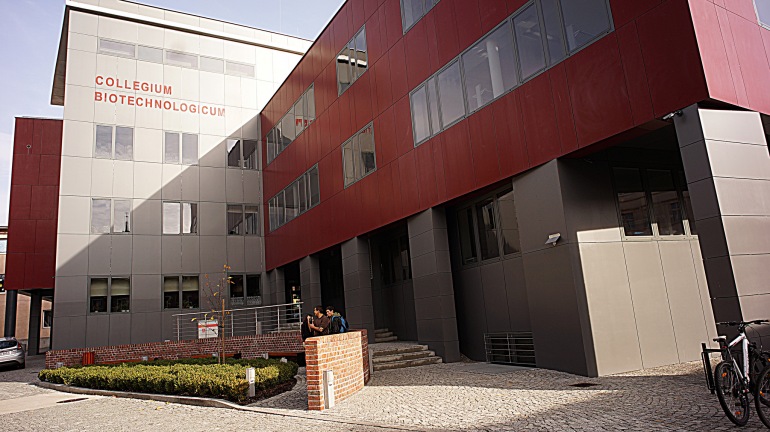Chair of Biotechnology and Molecular Biology

Chair of Biotechnology and Molecular Biology
The Chair of Biotechnology and Molecular Biology was founded in 2005 and located in a very modern three-floor building Collegium Biotechnologicum, equipped with specialist laboratory apparatus, which was co-financed by the EU. The Chair consists of two departments: Department of Biotechnology and Department of Physicochemical Research and 15 Laboratories. There are 35 members of staff, including six full professors and eight habilitated doctors, whose research outcome consists of 13 monographs, 42 chapters in monographs, 160 papers published in journals from the Philadelphia List and 18 patents. The Chair cooperates with research institutions in Poland and abroad, e.g. Odessa, Dubna, Hradec Králové, University of Colorado, Leibniz, Norwegian Meteorological Institute. As a result of the cooperation bacteria composites which were used for biodegradable methods for waste and sewage.
Research areas:
- bio-utilisation
of organic waste with the use of active autochthonic and museum strains;
- genetic
adaptation of chosen strains of micro-organisms in regard to bio-utilisation of
organic compounds;
- bioleaching
of metal ores (European Union project);
- kinetics
of chosen enzyme reactions;
- cloning
and sequencing of Saccharomyces cerevisiae genes responsible for intracellular
breathing processes;
- monitoring of forest
ecosystems;
- fungi in agrocenosis,
pathogens of crop plants;
- fungi in
construction, studying harmfulness and control;
- evaluation of
microbiological activity of micro-organisms;
- non-embryonic human
stem cells;
- methods of
examining changeability of human morphological traits;
Study programmes:
Biotechnology can be recommended to prospective students who are interested in microbiology, biochemistry, molecular biology, genetics, environmental protection, bioengineering, bioinformatics, and medicine. Biotechnological methods are used in medicine, environmental protection, agriculture and industry. Students can develop their interests in the Student Research Group and present the outcome of their research in national and international conferences.
Biotechnology - 3.5-year
engineering programme
Biotechnology
- 3-year BA programme
Applied Biotechnology
2-year MA programme
Biotechnology in Cosmetology - 2-year
MA programme
Future Careers:
Graduates of Biotechnology are prepared for work in:
- Biotechnological industry and related industries
- Research and diagnostic laboratories
They have knowledge and skills to:
- perform basic analytics and basic research with the use of biological
material
- operate research and technical devices and tools
- design and conduct an experiment
- prepare and conduct biotechnological processes
- use IT for obtaining information and designing biotechnological
processes
- use modern lab techniques including molecular technologies
- prepare and optimize biotechnological processes used in food
industry and environmental protection
- supervise the proper use of cosmetics and cosmetic techniques
- evaluate the quality of cosmetic materials and products
Admisions:
Admissions information: https://rekrutacja.uni.opole.pl/kierunki.php?tryb=katalog
More information: http://www.biotechnologia.uni.opole.pl/show.php?id=25&lang=pl&m=1
Contact:
Chair of Biotechnology and Molecular Biology
University of Opole
ul. Kominka 6a 45-032 Opole, Poland
Phone: +48 77 401 6050
E-mail: kbsie@uni.opole.pl
Web: http://www.biotechnologia.uni.opole.pl

